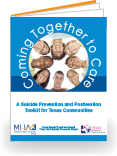
If you feel suicidal or you need to help someone else who does, put down this toolkit and call for help immediately.
On the Phone
Call 1 (800) 273-TALK (8255) to be connected to a suicide and crisis center in your area.
The National Suicide Prevention Lifeline is the only national suicide prevention and intervention telephone resource funded by the Federal Government. Its mission is to provide immediate assistance to individuals in suicidal crisis by connecting them to the nearest available suicide prevention and mental health service provider through a 24-hour, toll-free telephone number-1-800-273-TALK (8255). http://www.suicidepreventionlifeline.org
- Call the local crisis center listed in the first few pages of your local phone directory.
- Call 911 and ask for the mental health crisis team of your local law enforcement agency.
- Call or go to the nearest hospital emergency room in your area.
- Call one of the Texas crisis centers listed in the Appendices section of this toolkit.
- Call your doctor or other health care provider for a referral to someone who provides suicide prevention and intervention services.
On the Web
HelpPRO Therapist Finder: Finding a Therapist in Your Area. HelpPRO’s database contains detailed information on thousands of mental health professionals across the country. Click here to access this database. (LINK to www.helppro.com) Logo has been requested.
http://www.txcouncil.com.
The Texas Council of Community MHMR Centers has a list of Texas crisis lines supported by local mental health authorities on a county by county basis.
http://www.dshs.state.tx.us/mhservices/
The Texas Department of State Health Services, Community Mental Health Services division maintains an easy to use listing of local mental health authorities and their 24/7 crisis lines. You are able to search by county, city or zip code to find the one nearest you.
http://www.befrienders.org
An international, multilingual, 24-hour confidential service operated by the Samaritans.
You have made the right choice to look for help. We hope you will contact someone right away.[/tab]
[/tabs]
Military and Veterans
- Call 1-800-273-TALK and press 1 Go to the Veterans Crisis Line home
- Veteran’s self-check quiz Take the quiz
- Chat live 1-to-1 with a counselor Veterans chat service
For more information on taking action and best practices for your community, see Chapters 3 – 6 in “Coming Together to
Care, A Suicide Prevention and Postvention Toolkit for Texas Communities,”
https://texassuicideprevention.org/docs_pdf/24215-Mental_Health_09_Suicide_Prev_Book_Complete_FINAL.pdf
Helping Someone Cope with Someone that Died by Suicide
Grief
Grief is a normal part of loss, but a loss by suicide complicates the grieving process. As with any sudden or unexpected death, those who have lost a loved one to death by suicide (often called survivors of suicide) have not had time to say goodbye. This suddenness, coupled with the violence of a death by suicide and common misunderstanding and stigma surrounding the death, can greatly intensify, complicate and extend the time of the grief process. It is important to remember and know that it may be normal for survivors to face guilt about being unable to save the life of their loved one and spend time asking “why” their love one took their own life before being able to move forward in the grief process. It is also important to know that survivors may be at increased risk of death by suicide themselves so that professional mental health support is readily available if needed. Anyone who believes or suspects that they are facing Complicated Grief and/or Post Traumatic Stress Disorder is encouraged to get professional mental health support.
To support someone who has lost a loved one to suicide, consider these important postvention goals:
- Provide support for normal grief process and minimize complicated grief and guilt reactions to the degree possible;
- Reduce the risk of further suicidal behavior (this may include efforts to remove firearms from the home, and /or providing gun locks as well as reducing exposure to lethal medications.
- Connect family and friends to health and mental health providers if needed and to community resources
- Provide education and information about best practices related to funerals and memorial services so that friends and family can help suicide clusters and contagion in the immediate aftermath of a suicide.
One way those who are supporting friends and family in the grieving process can assist is by providing reminders about the importance of self-care during this stressful and painful period. Self care includes:
- Getting rest and exercise
- Eating and hydrating properly
- Avoid use and/or increased use of alcohol and other substances
- Seek out supportive people
- Encourage them to ask for help and
- Have referrals available to offer when/if they reach out for help. This can be done by finding a:
- mental health professional: www.Helppro.com
- suicide survivor support group: www.survivorsofsuicide.com
Postvention in the Community:
Response to suicide has a profound affect on family, friends, organizations and the community as a whole. Therefore, how a community responds to a death by suicide plays a crucial role in preventing additional suicides through contagions and clusters. Postvention guidelines for communities can be found at:
http://riversidetraumacenter.com/documents/RiversideTraumaCenerPostventionGuidelines6_24_11.pdf
In addition, a comprehensive section on Postvention can be found in Chapter 6 of the Texas Suicide Prevention Toolkit.


